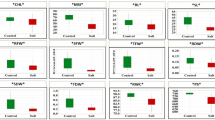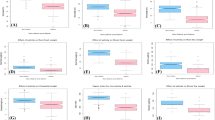Abstract
Emmer wheat as the progenitor of common wheat, holds the genetic potentiality for improvement of wheat yield, quality and stress tolerance such as drought and salt. To comprehensively evaluate the salt tolerance of emmer wheat, a total of 30 traits including growth, physiology and photosynthesis related as well as K+ and Na+ content of 30 wild emmer and 14 durum wheat accessions were systematically investigated and compared between normal and saline conditions. Salt tolerance index (STI) based on multiple regression analysis of these traits was calculated and five wild emmer accessions showed high salt tolerance, which could be used as valuable resource for wheat salt tolerance improvement. Furthermore, wild emmer genotypes showed wider trait performance variation compared to durum wheat, indicating the higher genetic diversity in wild emmer wheat. Then, shoot Na+ content, shoot K+/Na+ ratio, root length and root surface area were identified as suitable indexes for salt tolerance evaluation. Na+ exclusion mechanism was found to be playing an important role in response to salt stress in emmer wheat. The salt tolerance in emmer wheat was systematically characterized here, which not only provided the elite germplasm for wheat improvement, but also provided the efficient method and some useful indexes for salt tolerance assessing.





Similar content being viewed by others
Abbreviations
- STI:
-
Salt tolerance index based on TWD
- Chlo:
-
Chlorophyll content (SPAD-values)
- Tiller:
-
Tiller number
- SDW:
-
Shoot dry weight (g)
- RDW:
-
Root dry weight (g)
- TDW:
-
Total dry weight (g)
- R_S:
-
Root/shoot ratio
- SFW:
-
Shoot fresh weight (g)
- RFW:
-
Root fresh weight (g)
- TFW:
-
Total fresh weight (g)
- RWC_shoot:
-
Relative water content of shoot (%)
- RWC_root:
-
Relative water content of root (%)
- RWC_total:
-
Relative water content (%)
- Root_len:
-
Root length (cm)
- Root_Sur:
-
Root surface area (cm2)
- Root_Diam:
-
Root diameter (mm)
- Root_Volu:
-
Root volume (cm3)
- SRL:
-
Specific root length (cm g−1)
- SSA:
-
Specific root surface area (cm2 g−1)
- TD:
-
Tissue density of root (g/cm3)
- Pn:
-
Photosynthetic rate [μmol (CO2) m−2 s−1)
- Trmmol:
-
Transpiration rate (mmol m−2 s−1)
- Gs:
-
Stomatal conductance [μmol (H2O) m−2 s−1]
- Ci:
-
Internal CO2 concentration (μmol mol−1)
- WUE:
-
Water use efficiency of leaf (μmol mol−1)
- shootK:
-
K+ content of shoot (mg g−1)
- shootNa:
-
Na+ content of shoot (mg g−1)
- rootK:
-
K+ content of root (mg g−1)
- rootNa:
-
Na+ content of root (mg g−1)
- shootK_Na_R:
-
K+/Na+ ratio of shoot
- root_K_Na_R:
-
K+/Na+ ratio of root
References
Anschutz U, Becker D, Shabala S (2014) Going beyond nutrition: regulation of potassium homoeostasis as a common denominator of plant adaptive responses to environment. J Plant Physiol 171:670–687. doi:10.1016/j.jplph.2014.01.009
Chen Z, Newman I, Zhou M, Mendham N, Zhang G, Shabala S (2005) Screening plants for salt tolerance by measuring K+ flux: a case study for barley. Plant Cell Environ 28:1230–1246. doi:10.1111/j.1365-3040.2005.01364.x
Chen Z, Cuin TA, Zhou M, Twomey A, Naidu BP, Shiabala S (2007) Compatible solute accumulation and stress-mitigating effects in barley genotypes contrasting in their salt tolerance. J Exp Bot 58:4245–4255. doi:10.1093/jxb/erm284
Cherel I, Lefoulon C, Boeglin M, Sentenac H (2014) Molecular mechanisms involved in plant adaptation to low K+ availability. J Exp Bot 65:833–848. doi:10.1093/jxb/ert402
Chhipa BR, Lal P (1995) Na/K ratios as the basis of salt tolerance in wheat. Aust J Agr Res 46:533–539. doi:10.1071/Ar9950533
Colmer TD, Flowers TJ, Munns R (2006) Use of wild relatives to improve salt tolerance in wheat. J Exp Bot 57:1059–1078. doi:10.1093/jxb/erj124
De Leon TB, Linscombe S, Gregorio G, Subudhi PK (2015) Genetic variation in Southern USA rice genotypes for seedling salinity tolerance. Front Plant Sci 6:374. doi:10.3389/fpls.2015.00374
Deng YQ, Bao J, Yuan F, Liang X, Feng ZT, Wang BS (2016) Exogenous hydrogen sulfide alleviates salt stress in wheat seedlings by decreasing Na+, content. Plant Growth Regul 79:391–399
Dvorak J, Akhunov ED (2005) Tempos of gene locus deletions and duplications and their relationship to recombination rate during diploid and polyploid evolution in the Aegilops-Triticum alliance. Genetics 171:323–332. doi:10.1534/genetics.105.041632
El-Hendawy SE, Hu YC, Yakout GM, Awad AM, Hafiz SE, Schmidhalter U (2005) Evaluating salt tolerance of wheat genotypes using multiple parameters. Eur J Agron 22:243–253. doi:10.1016/j.eja.2004.03.002
FAO (2010) FAO land and plant nutrition management service: http://www.faoorg/ag/agl/agll/spush. Assessed 1 Mar 2017
Farissi M, Faghire M, Bargaz A, Bouizgaren A, Makoudi B, Sentenac H, Ghoulam C (2014) Growth, nutrients concentrations, and enzymes involved in plants nutrition of alfalfa populations under saline conditions. J Agr Sci Tech-Iran 16:301–314
Fox J, Leeuw JD, Zeileis A (2005) The R commander: a basic-statistics graphical user interface to R. J Stat Softw 14:288–301
Genc Y, McDonald GK, Tester M (2007) Reassessment of tissue Na(+) concentration as a criterion for salinity tolerance in bread wheat. Plant Cell Environ 30:1486–1498. doi:10.1111/j.1365-3040.2007.01726.x
Ginestet C (2011) ggplot2: elegant graphics for data analysis. J R Stat Soc A 174:245–245. doi:10.1111/j.1467-985X.2010.00676_9.x
Hauser F, Horie T (2010) A conserved primary salt tolerance mechanism mediated by HKT transporters: a mechanism for sodium exclusion and maintenance of high K+/Na+ ratio in leaves during salinity stress. Plant Cell Environ 33:552–565. doi:10.1111/j.1365-3040.2009.02056.x
Hothorn T, Bretz F, Westfall P (2008) Simultaneous inference in general parametric models. Biometrical J 50:346–363. doi:10.1002/bimj.200810425
Huang L et al (2016) Evolution and adaptation of wild emmer wheat populations to biotic and abiotic stresses. Annu Rev Phytopathol 54:279–301. doi:10.1146/annurev-phyto-080614-120254
James RA, Davenport RJ, Munns R (2006) Physiological characterization of two genes for Na+ exclusion in durum wheat, Nax1 and Nax2. Plant Physiol 142:1537–1547. doi:10.1104/pp.106.086538
James RA, Blake C, Byrt CS, Munns R (2011) Major genes for Na+ exclusion, Nax1 and Nax2 (wheat HKT1;4 and HKT1;5), decrease Na+ accumulation in bread wheat leaves under saline and waterlogged conditions. J Exp Bot 62:2939–2947. doi:10.1093/jxb/err003
Jayakannan M, Bose J, Babourina O, Rengel Z, Shabala S (2015) Salicylic acid in plant salinity stress signalling and tolerance. Plant Growth Regul 76:25–40
Ma LQ, Zhou EF, Huo NX, Zhou RH, Wang GY, Jia JZ (2007) Genetic analysis of salt tolerance in a recombinant inbred population of wheat (Triticum aestivum L.). Euphytica 153:109–117. doi:10.1007/s10681-006-9247-8
Munns R, James RA (2003) Screening methods for salinity tolerance: a case study with tetraploid wheat. Plant Soil 253:201–218. doi:10.1023/A:1024553303144
Munns R, Tester M (2008) Mechanisms of salinity tolerance. Annu Rev Plant Biol 59:651–681. doi:10.1146/annurev.arplant.59.032607.092911
Munns R, Hare RA, James RA, Rebetzke GJ (2000) Genetic variation for improving the salt tolerance of durum wheat. Aust J Agr Res 51:69–74. doi:10.1071/Ar99057
Munns R, James RA, Lauchli A (2006) Approaches to increasing the salt tolerance of wheat and other cereals. J Exp Bot 57:1025–1043. doi:10.1093/jxb/erj100
Munns R et al (2012) Wheat grain yield on saline soils is improved by an ancestral Na+ transporter gene. Nat Biotechnol 30:360-U173. doi:10.1038/nbt.2120
Nevo E, Beiles A (1989) Genetic diversity of wild emmer wheat in Israel and Turkey: structure, evolution, and application in breeding. Theor Appl Genet 77:421–455. doi:10.1007/BF00305839
Nevo E, Chen GX (2010) Drought and salt tolerances in wild relatives for wheat and barley improvement. Plant Cell Environ 33:670–685. doi:10.1111/j.1365-3040.2009.02107.x
Nevo E, Gorham J, Beiles A (1992) Variation for 22Na uptake in wild emmer wheat, triticum dicoccoides in Israel: salt tolerance resources for wheat improvement. J Exp Bot 43(4):511–518
Nevo E, Krugman T, Beiles A (1993) Genetic-resources for salt tolerance in the wild progenitors of wheat (Triticum-Dicoccoides) and Barley (Hordeum-Spontaneum) in Israel. Plant Breed 110:338–341. doi:10.1111/j.1439-0523.1993.tb00599.x
Oyiga BC, Sharma RC, Shen J, Baum M, Ogbonnaya FC, Leon J, Ballvora A (2016) Identification and characterization of salt tolerance of wheat germplasm using a multivariable screening approach. J Agron Crop Sci 202:472–485. doi:10.1111/jac.12178
Pires IS, Negrao S, Oliveira MM, Purugganan MD (2015) Comprehensive phenotypic analysis of rice (Oryza sativa) response to salinity stress. Physiol Plant 155:43–54. doi:10.1111/ppl.12356
Qadir M et al (2014) Economics of salt-induced land degradation and restoration. Nat Resour Forum 38:282–295. doi:10.1111/1477-8947.12054
Qiu L et al (2011) Evaluation of salinity tolerance and analysis of allelic function of HvHKT1 and HvHKT2 in Tibetan wild barley. Theor Appl Genet 122:695–703. doi:10.1007/s00122-010-1479-2
Ren J et al (2013) SNP-revealed genetic diversity in wild emmer wheat correlates with ecological factors. BMC Evol Biol 13:169. doi:10.1186/1471-2148-13-169
Roy SJ, Negrao S, Tester M (2014) Salt resistant crop plants. Curr Opin Biotechnol 26:115–124. doi:10.1016/j.copbio.2013.12.004
Shavrukov Y, Langridge P, Tester M (2009) Salinity tolerance and sodium exclusion in genus Triticum. Breeding Sci 59:671–678
Shavrukov Y, Langridge P, Tester M, Nevo E (2010) Wide genetic diversity of salinity tolerance, sodium exclusion and growth in wild emmer wheat, Triticum dicoccoides. Breeding Sci 60:426–435. doi:10.1270/jsbbs.60.426
Shen Q, Fu L, Qiu L, Xue F, Zhang GP, Wu D (2016) Time-course of ionic responses and proteomic analysis of a Tibetan wild barley at early stage under salt stress. Plant Growth Regul 1:1–11
Tajbakhsh M, Zhou MX, Chen ZH, Mendham NJ (2006) Physiological and cytological response of salt-tolerant and non-tolerant barley to salinity during germination and early growth. Aust J Exp Agric 46:555–562. doi:10.1071/Ea05026
Talei D, Valdiani A, Yusop MK, Abdullah MP (2013) Estimation of salt tolerance in Andrographis paniculata accessions using multiple regression model. Euphytica 189:147–160. doi:10.1007/s10681-012-0782-1
Xie WL, Nevo E (2008) Wild emmer: genetic resources, gene mapping and potential for wheat improvement. Euphytica 164:603–614. doi:10.1007/s10681-008-9703-8
Yang CW et al (2014) Evolution of physiological responses to salt stress in hexaploid wheat. Proc Natl Acad Sci USA 111:11882–11887. doi:10.1073/pnas.1412839111
Zeng L, Shannon MC, Grieve CM (2002) Evaluation of salt tolerance in rice genotypes by multiple agronomic parameters. Euphytica 127:235–245. doi:10.1023/A:1020262932277
Zhu M, Shabala S, Shabala L, Fan Y, Zhou MX (2016) Evaluating predictive values of various physiological indices for salinity stress tolerance in wheat. J Agron Crop Sci 202:115–124. doi:10.1111/jac.12122
Acknowledgements
All authors are grateful to Dr. Pingchuan Deng for his help on root data collection and also thankful to the anonymous reviewers for their valuable and constructive comments. This work was mainly supported by the National Natural Science Foundation of China (Grant Nos. 31401373 and 31571647), and partially supported and the Fundamental Research Funds for the Central Universities of China (Grant No. 2452015003).
Author information
Authors and Affiliations
Contributions
FKW and CLC performed the whole experiments, statistical analysis and also wrote the paper. LSZ contributed to trait investigation and manuscript revision. BJX and WM contributed to greenhouse work and Na+ and K+ content measurement. SWN reviewed the manuscript. NXJ conceived this study and revised the manuscript. All authors read and approved the final manuscript.
Corresponding author
Ethics declarations
Conflict of interest
The authors declare that they have no competing interest.
Additional information
Kewei Feng and Licao Cui have contributed equally to this work.
Electronic supplementary material
Below is the link to the electronic supplementary material.
Rights and permissions
About this article
Cite this article
Feng, K., Cui, L., Lv, S. et al. Comprehensive evaluating of wild and cultivated emmer wheat (Triticum turgidum L.) genotypes response to salt stress. Plant Growth Regul 84, 261–273 (2018). https://doi.org/10.1007/s10725-017-0337-5
Received:
Accepted:
Published:
Issue Date:
DOI: https://doi.org/10.1007/s10725-017-0337-5




